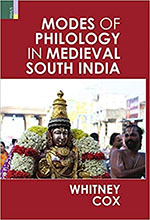Commentarial traditions and language-centred interpretive conventions were arguably the most important modes of knowledge production in India for much of the second millennium CE. This practice commenced in all earnest in the eighth century CE, although we know of several instances of earlier commentaries too, including Patañjali’s Mahābhāṣya that is older than the first century BCE. Modern scholarship has relied upon these works for a long time, and works such as Sāyaṇa’s commentary on the Rigvēda and the ones on the bṛhattraya texts (Bhāravi’s Kirātārjunīya, Māgha’s Śiśupālavadha and Śrīharṣa’s Naiṣadhīyacarita) have been indispensable in producing critical editions of the respective texts. Even so, we do not have a monograph on the history of commentarial texts and commentary-oriented knowledge practices from precolonial India. The significance of this bewildering class of literature has begun to invite scholarly scrutiny only in the last two decades. Whitney Cox’s Modes of Philology in Medieval South India is a recent addition to this gradually expanding oeuvre of research. Under review is the Indian edition of the book, originally published by Koninklijke Brill NV, Leiden, in 2017.
Cox’s is a sustained reflection on what he calls ways of doing philology, which is a novel way of approaching the commentaries and commentarial modes in textual production. ‘A comprehensive historical survey of these practices remains a task for the future, a scholarly desideratum that must necessarily be the work of many hands’ (p. 170). The attempt made in this work is limited, and has its focus on a set of works produced between 1100 and 1400 CE in Tamil Nadu.

